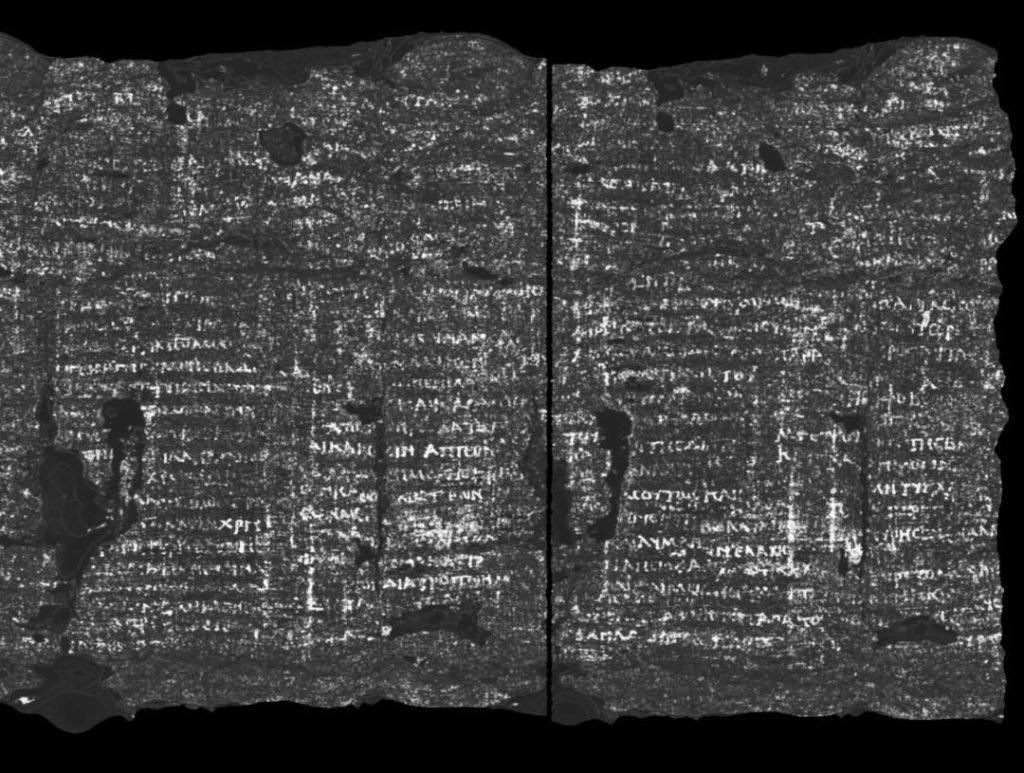
2,000-year-old scroll decoded using cutting-edge X-ray imaging
In a groundbreaking discovery, researchers have successfully decoded a 2,000-year-old scroll buried by the eruption of Mount Vesuvius in 79 AD. The scroll, which was authored by the Greek philosopher Philodemus, was virtually unwrapped using 3D X-ray scans and artificial intelligence (AI). This remarkable breakthrough has shed new light on ancient texts and provides a unique glimpse into the life and thoughts of Philodemus, a prominent philosopher of the Hellenistic period.
The scroll was found in a villa in Herculaneum, a town that was destroyed by the eruption of Mount Vesuvius. The villa is believed to have been owned by Lucius Calpurnius Piso Caesoninus, the father-in-law of Julius Caesar. The discovery is a significant find, not only because of its age but also due to the historical significance of the villa and its contents.
The scroll, which is approximately 20 meters long, was buried in a carbonized state, making it extremely fragile and difficult to read. Traditional methods of conservation and decoding were not effective, as the papyrus was so fragile that even the slightest touch could cause it to disintegrate.
To overcome this challenge, a team of researchers from the University of Pisa, Italy, used cutting-edge technology to virtually unwrap the scroll. The team employed 3D X-ray scans to create a detailed digital image of the scroll, which was then analyzed using AI algorithms.
The process involved creating a high-resolution 3D model of the scroll, which allowed the researchers to virtually unwrap it and examine the text without physically touching the fragile papyrus. The AI algorithms were used to enhance the image quality, remove distortions, and recognize the text.
The decoded text reveals that the scroll is a philosophical treatise written by Philodemus, who was a student of the philosopher Aristarchus of Samos. The text is a commentary on the works of Aristotle and provides insights into the philosophical debates of the time.
Philodemus was a prominent figure in the Hellenistic period, and his works were widely studied and admired in ancient Greece and Rome. His philosophical ideas were influenced by Aristotelian philosophy, and his writings provide valuable insights into the intellectual debates of the time.
The decoded scroll has significant implications for the study of ancient philosophy and provides a unique glimpse into the life and thoughts of Philodemus. The discovery also highlights the importance of using cutting-edge technology to recover and conserve ancient texts.
“This is a major breakthrough in recovering ancient texts,” said Dr. Maria Grazia, lead researcher on the project. “The use of 3D X-ray scans and AI algorithms has allowed us to virtually unwrap the scroll and examine the text without damaging the fragile papyrus. This technology has the potential to revolutionize the way we recover and conserve ancient texts.”
The decoded scroll is now being translated and analyzed by researchers, who are working to understand the significance of the text and its implications for the study of ancient philosophy. The discovery is a significant find, not only for researchers but also for the general public, who will be able to learn more about the life and thoughts of Philodemus and the intellectual debates of the ancient world.






